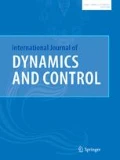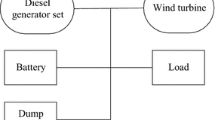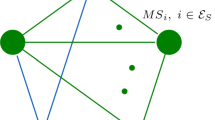Abstract
In the present paper a decentralized control scheme that relies on sliding mode (SM) and high gain control methodologies to regulate the load voltage in buck-based islanded direct current (DC) microgrids is designed. First, the model of a buck-based islanded DC microgrid consisting of several Distributed Generation units interconnected through an arbitrary complex and meshed topology including rings is introduced. More precisely, the topology of the power network is represented by its corresponding incidence matrix, and in the model the power lines dynamics is considered. Moreover, it is assumed that the microgrid is affected by unknown load demand and unavoidable modelling uncertainties. A mixed strategy, employing both a third-order sliding mode (3-SM) control algorithm and a high gain control strategy, with a fuzzy scheduling is designed to solve the voltage control problem in a decentralized manner. Specifically, the high-gain control reduces the stress on the generator during abrupt reference changes, the 3-SM guarantees finite-time voltage regulation and strong robustness with respect to load variations. Fuzzy scheduling merges the two strategies. Finally, detailed simulation results confirm the effectiveness of the proposed control strategy.














Similar content being viewed by others
Notes
For the sake of simplicity, the dependence of all the variables on time t is omitted throughout the paper.
The relative degree is the minimum order \(\rho \) of the time derivative \(\sigma _i^{(\rho )}, i=1, \dots , n\), of the sliding variable associated to the i-th node in which the control \(u_i, i=1, \dots , n\), explicitly appears.
References
Ackermann T, Andersson G, Söder L (2001) Distributed generation: a definition1. Electr Power Syst Res 57(3):195–204
Pepermans G, Driesen J, Haeseldonckx D, Belmans R, D’haeseleer W (2005) Distributed generation: definition, benefits and issues. Energy Policy 33(6):787–798
Blaabjerg F, Teodorescu R, Liserre M, Timbus AV (2006) Overview of control and grid synchronization for distributed power generation systems. IEEE Trans Ind Electron 53(5):1398–1409
Carrasco JM, Franquelo LG, Bialasiewicz JT, Galvan E, PortilloGuisado RC, Prats MAM, Leon JI, Moreno-Alfonso N (2006) Power-electronic systems for the grid integration of renewable energy sources: a survey. IEEE Trans Ind Electron 53(4):1002–1016
Liserre M, Sauter T, Hung JY (2010) Future energy systems: integrating renewable energy sources into the smart power grid through industrial electronics. IEEE Ind Electron Mag 4(1):18–37
Katiraei F, Iravani MR (2006) Power management strategies for a microgrid with multiple distributed generation units. IEEE Trans Power Syst 21(4):1821–1831
Farhangi H (2010) The path of the smart grid. IEEE Power Energy Mag 8(1):18–28
Hatziargyriou N, Asano H, Iravani R, Marnay C (2007) Microgrids. IEEE Power Energy Mag 5(4):78–94
Lasseter R (2002) Microgrids. In: IEEE power engineering society winter meeting, vol 1, pp 305–308
Lasseter R, Paigi P (2004) Microgrid: a conceptual solution. In: Proc. 35th IEEE power electron. specialists conf., Aachen, vol 6, pp 4285–4290
Katiraei F, Iravani M, Lehn P (2005) Micro-grid autonomous operation during and subsequent to islanding process. IEEE Trans Power Deliv 20(1):248–257
Lopes JAP, Moreira CL, Madureira AG (2006) Defining control strategies for microgrids islanded operation. IEEE Trans Power Syst 21(2):916–924
Guerrero JM, Chandorkar M, Lee T-L, Loh PC (2013) Advanced control architectures for intelligent microgrids, part i: decentralized and hierarchical control. IEEE Trans Ind Electron 60(4):1254–1262
Sadabadi MS, Shafiee Q, Karimi A (2016) Plug-and-play voltage stabilization in inverter-interfaced microgrids via a robust control strategy. IEEE Trans Control Syst Technol PP(99):1–11
Cucuzzella M, Incremona GP, Ferrara A (2015) Design of robust higher order sliding mode control for microgrids. IEEE J Emerg Sel Topics Circuits Syst 5(3):393–401
Incremona GP, Cucuzzella M, Ferrara A (2016) Adaptive suboptimal second-order sliding mode control for microgrids. Int J Control 89(9):1849–1867
Cucuzzella M, Incremona GP, Ferrara A (2017) Decentralized sliding mode control of islanded ac microgrids with arbitrary topology. IEEE Trans Ind Electron 64(8):6706–6713
Guida B, Cavallo A (2012) Supervised bidirectional dc/dc converter for intelligent fuel cell vehicles energy management. In: Electric Vehicle Conference (IEVC), 2012 IEEE International. IEEE. pp 1–5
Canciello G, Cavallo A, Guida B (2017) Control of energy storage systems for aeronautic applications. J Control Sci Eng 2017:2458590
Canciello G, Cavallo A, Guida B (2017) Robust control of aeronautical electrical generators for energy management applications. Int J Aerosp Eng 2017:1745154
Canciello G, Russo A, Guida B, Cavallo A (2018) Supervisory control for energy storage system onboard aircraft. In: 2018 IEEE international conference on environment and electrical engineering and 2018 IEEE industrial and commercial power systems Europe (EEEIC/I&CPS Europe). IEEE, pp 1–6
Guida B, Cavallo A (2013) A petri net application for energy management in aeronautical networks. In: Emerging Technologies & Factory Automation (ETFA), 2013 IEEE 18th Conference on. IEEE. pp 1–6
Guerrero JM, Vasquez JC, Matas J, de Vicuna LG, Castilla M (2011) Hierarchical control of droop-controlled ac and dc microgrids—a general approach toward standardization. IEEE Trans Ind Electron 58(1):158–172
Justo JJ, Mwasilu F, Lee J, Jung J-W (2013) Ac-microgrids versus dc-microgrids with distributed energy resources: a review. Renew Sustain Energy Rev 24:387–405
Rodriguez-Diaz E, Savaghebi M, Vasquez JC, Guerrero JM (2015) An overview of low voltage dc distribution systems for residential applications. In: 2015 IEEE 5th international conference on Consumer electronics—Berlin (ICCE-Berlin), pp 318–322
Guida B, Rubino L, Marino P, Cavallo A (2010) Implementation of control and protection logics for a bidirectional dc/dc converter. In: Industrial Electronics (ISIE), 2010 IEEE International Symposium on. IEEE. pp 2696–2701
Cucuzzella M, Rosti S, Cavallo A, Ferrara A (2017) Decentralized sliding mode voltage control in dc microgrids. In: Proc. American control conf, Seattle
Cucuzzella M, Lazzari R, Trip S, Rosti S, Sandroni C, Ferrara A (2018) Sliding mode voltage control of boost converters in DC microgrids. Control Eng Pract 73:161–170
Ferreira RAF, Braga HAC, Ferreira AA, Barbosa PG (2012) Analysis of voltage droop control method for dc microgrids with simulink: modelling and simulation. In: 2012 10th IEEE/IAS international conference on industry applications (INDUSCON), pp 1–6
Cucuzzella M, Trip S, De Persis C, Cheng X, Ferrara A, van der Schaft A (2018) A robust consensus algorithm for current sharing and voltage regulation in DC microgrids. IEEE Trans Control Syst Technol. https://doi.org/10.1109/TCST.2018.2834878
Trip S, Cucuzzella M, Cheng X, Scherpen J (2019) Distributed averaging control for voltage regulation and current sharing in DC microgrids. IEEE Control Syst Lett 3(1):174–179
Chen YK, Wu YC, Song CC, Chen YS (2013) Design and implementation of energy management system with fuzzy control for dc microgrid systems. IEEE Trans Power Electron 28(4):1563–1570
Kakigano H, Miura Y, Ise T (2013) Distribution voltage control for dc microgrids using fuzzy control and gain-scheduling technique. IEEE Trans Power Electron 28(5):2246–2258
Shadmand MB, Balog RS, Abu-Rub H (2014) Model predictive control of pv sources in a smart dc distribution system: maximum power point tracking and droop control. IEEE Trans Energy Convers 29(4):913–921
Utkin VI (1992) Sliding modes in optimization and control problems. Springer, New York
Edwards C, Spurgen SK (1998) Sliding mode control: theory and applications. Taylor and Francis, London
Tan S-C, Lai YM, Cheung MKH, Tse CK (2005) On the practical design of a sliding mode voltage controlled buck converter. IEEE Trans Power Electron 20(2):425–437
Mahdavi J, Emadi A, Toliyat HA (1997) Application of state space averaging method to sliding mode control of pwm dc/dc converters. In: Industry applications conference, 1997. Thirty-second IAS annual meeting, IAS ’97., Conference record of the 1997 IEEE, vol 2, pp 820–827
Spiazzi G, Mattavelli P, Rossetto L (1997) Sliding mode control of dc–dc converters. System 2:1
Bartolini G, Ferrara A, Usai E (1998) Chattering avoidance by second-order sliding mode control. IEEE Trans Autom Control 43(2):241–246
Dinuzzo F, Ferrara A (2009) Higher order sliding mode controllers with optimal reaching. IEEE Trans Autom Control 54(9):2126–2136
Levant A (2003) Higher-order sliding modes, differentiation and output-feedback control. Int J Control 76(9–10):924–941
Cavallo A, Natale C (2003) Output feedback control based on a high-order sliding manifold approach. IEEE Trans Autom Control 48(3):469–472
Cavallo A, Canciello G, Guida B (2017) Supervisory control of dc–dc bidirectional converter for advanced aeronautic applications. Int J Robust Nonlinear Control. http://dx.doi.org/10.1002/rnc.3851
Cavallo A, Canciello G, Guida B, Kulsangcharoen P, Yeoh S, Rashed M, Bozhko S (2018) Multi-objective supervisory control for dc/dc converters in advanced aeronautic applications. Energies 11(11):3216
Cavallo A, Canciello G, Guida B (2017) Energy storage system control for energy management in advanced aeronautic applications. Math Probl Eng 2017:4083132
Cavallo A, Guida B, Buonanno A, Sparaco E (2015) Smart buck-boost converter unit operations for aeronautical applications. In: 54rd IEEE conference on decision and control, CDC 2015, pp 4734–4739
Cavallo A, Canciello G, Guida B (2017) Supervised control of buck-boost converters for aeronautical applications. Automatica 83:73–80
Cavallo A, de Maria G, Nistri P (1999) Robust control design with integral action and limited rate control. IEEE Trans Autom Control 44(8):1569–1572
Fahmy M (2010) A fuzzy algorithm for scheduling non-periodic jobs on soft real-time single processor system. Ain Shams Eng J 1(1):31–38
Plius MP, Yilmaz M, Seven U, Erbatur K (2012) Fuzzy controller scheduling for robotic manipulator force control. In: 2012 12th IEEE international workshop on advanced motion control (AMC), pp 1–8
Syed FU, Kuang ML, Smith M, Okubo S, Ying H (2009) Fuzzy gain-scheduling proportional-integral control for improving engine power and speed behavior in a hybrid electric vehicle. IEEE Trans Veh Technol 58(1):69–84
Author information
Authors and Affiliations
Corresponding author
Rights and permissions
About this article
Cite this article
Canciello, G., Cavallo, A., Cucuzzella, M. et al. Fuzzy scheduling of robust controllers for islanded DC microgrids applications. Int. J. Dynam. Control 7, 690–700 (2019). https://doi.org/10.1007/s40435-018-00506-5
Received:
Revised:
Accepted:
Published:
Issue Date:
DOI: https://doi.org/10.1007/s40435-018-00506-5




